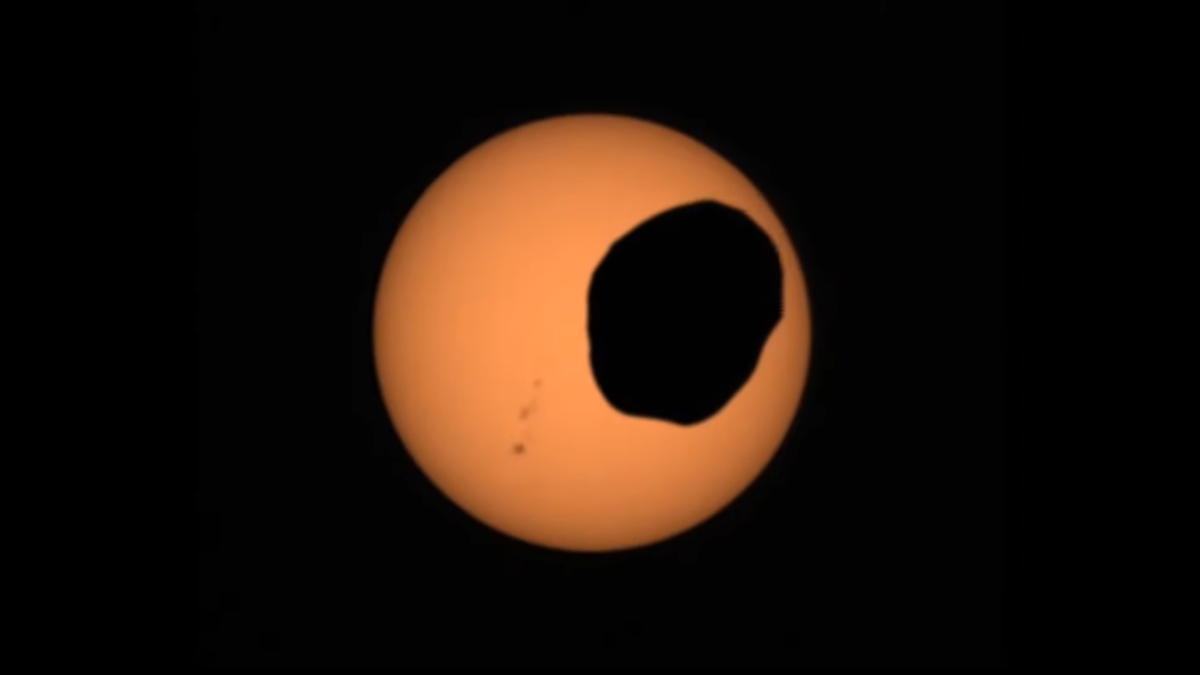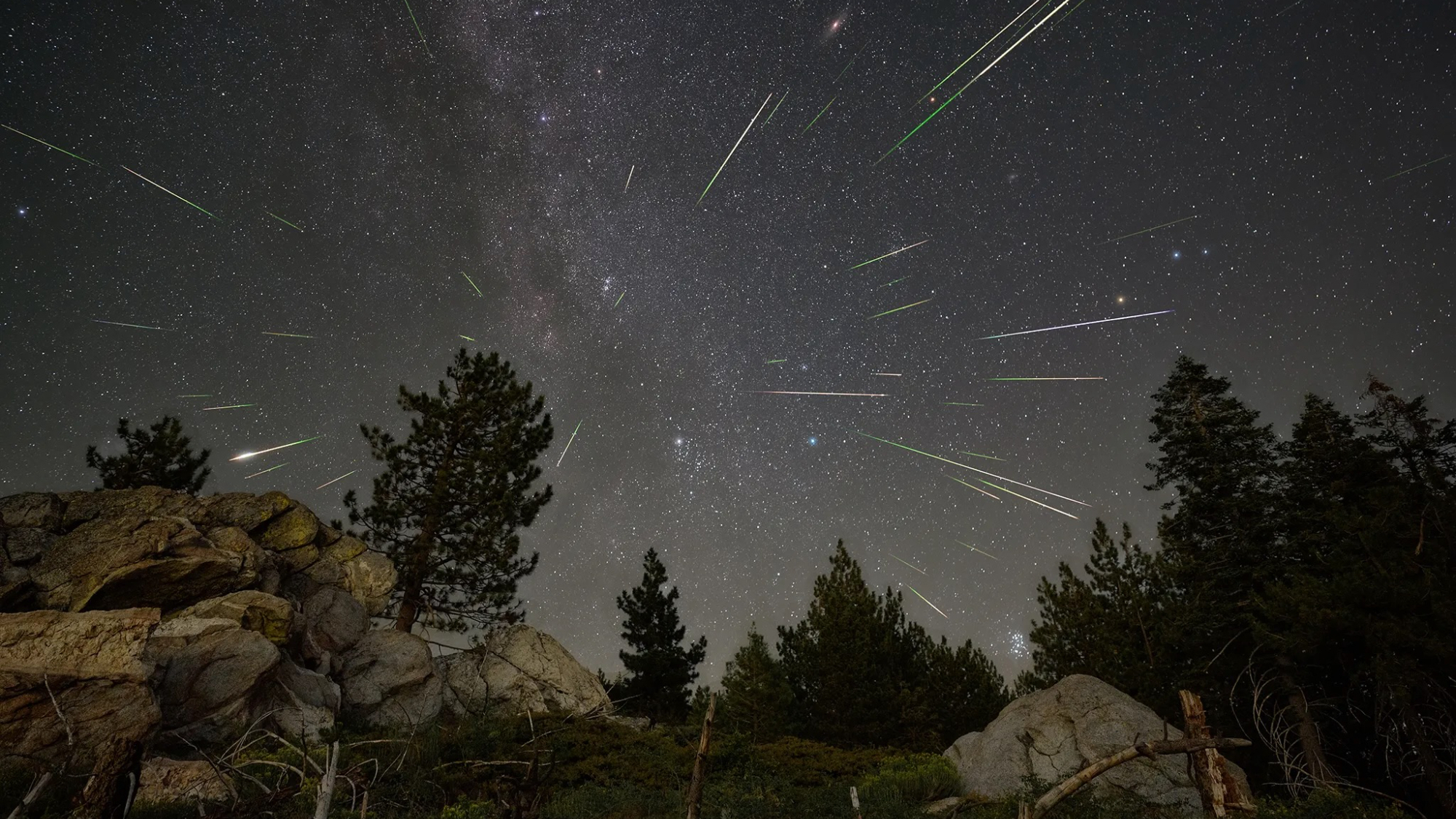Wow! Perseverance rover captures gorgeous video of solar eclipse on Mars
These are truly otherworldly shots.

The tiny Mars moon Phobos looms large on the sun's face in dramatic eclipse footage captured by NASA's Perseverance rover.
The life-seeking Perseverance took a break April 2 from its quest to reach an ancient Red Planet river delta (its successful arrival there was announced yesterday) to observe the minuscule moon passing across the sun.
"These observations can help scientists better understand the moon’s orbit and how its gravity pulls on the Martian surface, ultimately shaping the Red Planet’s crust and mantle," officials with NASA's Jet Propulsion Laboratory (JPL) in Southern California, which manages Perseverance's mission, said in a statement about the new eclipse video.
Other Mars rovers, such as NASA's Curiosity, have observed solar eclipses. But the new shots from Perseverance's Mastcam-Z camera provide the most powerful view yet of such an event, featuring a high frame rate not used before on the Martian surface, mission team members said.
"I knew it was going to be good, but I didn't expect it to be this amazing," Rachel Howson of Malin Space Science Systems in San Diego, one of the Mastcam-Z team members, said in the same statement.
Related: 12 amazing photos from the Perseverance rover's 1st year on Mars
Phobos, which is about 157 times smaller than Earth's moon, is one of Mars' two natural satellites. The other, Deimos, is even smaller than Phobos. Scientists think the two lumpy bodies may be former asteroids that were captured by Mars' gravity.
Get the Space.com Newsletter
Breaking space news, the latest updates on rocket launches, skywatching events and more!
Phobos is in a death spiral over Mars and will likely crash into the Red Planet's surface in a few tens of millions of years, researchers say.
Roughly 20 years of eclipse observations like this, taken from rovers on Mars, have refined the understanding of that moon's slowly collapsing orbit.
We're also learning more about the structure of Mars from such observations. "As Phobos circles Mars, its gravity exerts small tidal forces on the Red Planet's interior, slightly deforming rock in the planet's crust and mantle. These forces also slowly change Phobos' orbit," JPL officials said in the statement.
"As a result," they added, "geophysicists can use those changes to better understand how pliable the interior of Mars is, revealing more about the materials within the crust and mantle."
Solar eclipse guide 2022: When, where & how to see them
Past rover missions have caught Phobos and/or Deimos in action across the sun's face. JPL officials pointed to observations of Phobos from NASA's twin Spirit and Opportunity rovers in 2004, which mission team members stitched into a time-lapse video.
Curiosity's upgraded capabilities allowed the rover to capture solar eclipse videos, and its eclipse observations now number in the dozens. As of 2019, Curiosity, Opportunity and Spirit had collectively observed 40 eclipses by Phobos and eight solar transits by Deimos.
Perseverance's Mastcam-Z has a further upgrade compared to the camera systems of its predecessor rovers: a sunglasses-like filter that reduces the intensity of the sun's light, allowing scientists to see bumps and ridges in the outline of Phobos as well as a group of sunspots on the sun. (The sun has been active all month as a result of sunspots like those.)
Perseverance is on a years-long quest to hunt for signs of ancient life on Mars, and to collect and cache dozens of samples that may hold evidence of Red Planet organisms. NASA and the European Space Agency plan to return those samples to Earth via a sample-return campaign over the next decade or so.
Accompanying Perseverance on its journeys is an intrepid helicopter, Ingenuity. The little chopper has exceeded its planned flight manifest fivefold, achieving 25 airborne sorties to date.
Follow Elizabeth Howell on Twitter @howellspace. Follow us on Twitter @Spacedotcom or Facebook.
Join our Space Forums to keep talking space on the latest missions, night sky and more! And if you have a news tip, correction or comment, let us know at: community@space.com.

Elizabeth Howell (she/her), Ph.D., was a staff writer in the spaceflight channel between 2022 and 2024 specializing in Canadian space news. She was contributing writer for Space.com for 10 years from 2012 to 2024. Elizabeth's reporting includes multiple exclusives with the White House, leading world coverage about a lost-and-found space tomato on the International Space Station, witnessing five human spaceflight launches on two continents, flying parabolic, working inside a spacesuit, and participating in a simulated Mars mission. Her latest book, "Why Am I Taller?" (ECW Press, 2022) is co-written with astronaut Dave Williams.









